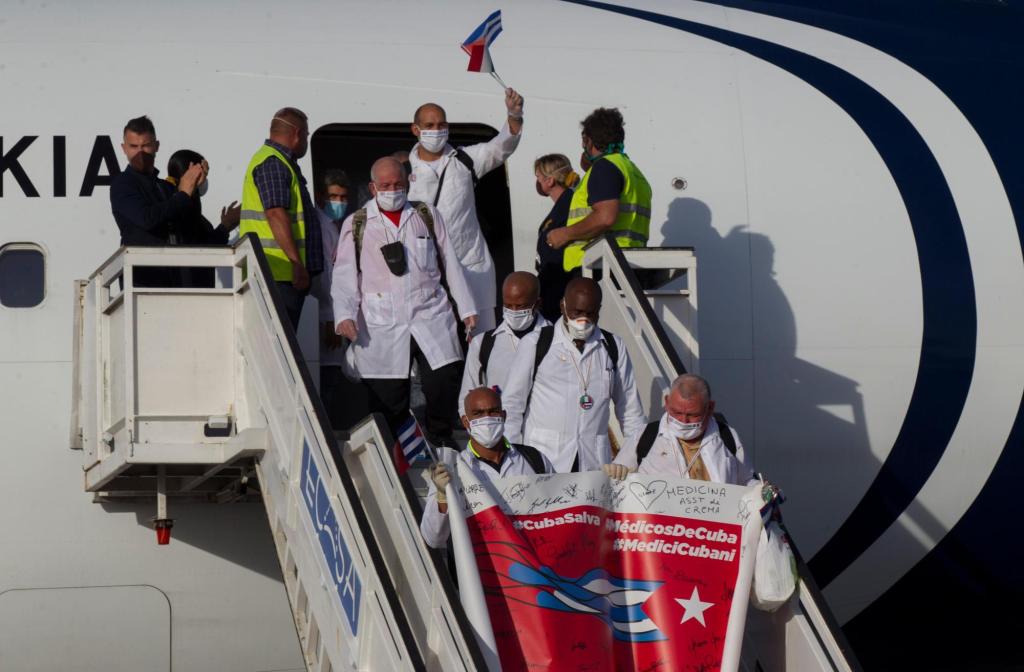
By DÁNICA COTO
SAN JUAN, Puerto Rico (AP) — An unusual request from the Inter-American Commission on Human Rights about Cuban medical brigades that operate worldwide and provide much needed help has roiled countries in the Caribbean and the Americas.
In a letter obtained by The Associated Press, the commission asks members of the Organization of American States, OAS, for details including whether they have an agreement with Cuba for medical missions, whether those workers have labor and union rights and information about any labor complaints.
“This was an unprecedented move,” said Francesca Emanuele, senior international policy associate at the Center for Economic and Policy Research in Washington. “It’s deeply troubling.”
Cuba has more than 22,000 doctors working in more than 50 countries, including in the Caribbean and the Americas, according to its government. A breakdown for the region was not available, but many impoverished nations in the Caribbean rely heavily on those medical professionals.
The commission, an independent body of the OAS, which is heavily funded by the U.S., said it plans to analyze the data collected as well as offer recommendations “given the persistence of reports of rights violations.”
A spokesperson for the commission declined comment, saying the letter is private.
The letter was sent after U.S. Secretary of State Marco Rubio announced visa restrictions in late February for Cuban or foreign government officials accused of involvement in Cuba’s medical missions, which he called “forced labor.”
“The timing is really suspicious,” Emanuele said, noting that the information requested “falls squarely” within the member states’ sovereign decision-making. “The role of this organization should not be distorted.”
In June, the administration of U.S. President Donald Trump slapped several unidentified officials from Central America with visa restrictions.
A deadline looms
Silence has prevailed since the human rights commission issued its May 24 letter giving OAS member states 30 days to respond.
“I’m awaiting a regional approach,” said Ralph Gonsalves, prime minister of St. Vincent and the Grenadines.
He said in a phone interview that he would raise the issue next week during a meeting of the Organization of Eastern Caribbean States as chairman.
“There are no human rights issues involved here,” he said, noting that St. Vincent is party to several international and labor conventions. “They have not been breached and will not be breached.”
Gonsalves said Cuban doctors run the sole hemodialysis center in St. Vincent that provides free care to 64 patients at a rate of $5 million a year.
“Without the Cubans, that dialysis center will close,” he said.
When asked if he worried about potential visa restrictions, Gonsalves said he met earlier this year with Rubio and provided a lengthy letter that he declined to share detailing the work of Cuban medical professionals in St. Vincent.
“We didn’t scrimp on any of the details,” he said. “I didn’t walk away from that meeting thinking that there was any possibility or threat of sanctions.”
A divided region
Guyana ‘s foreign minister, Hugh Todd, told The Associated Press on Friday that the government plans to amend its payment and recruitment system involving Cuban medical professionals.
He said their main concern “is to make sure we are compliant with international labor laws.” Todd did not say whether the planned amendments are related to concerns over U.S. visa restrictions.
Late Thursday, Guyanese Vice President Bharrat Jagdeo said the government wants to ensure that “the conditions of work here don’t run afoul of the requirements set by the United States of America.”
Guyana depends heavily on the U.S. for support, especially given an ongoing and bitter border dispute with neighboring Venezuela.
Some Caribbean leaders have said they would risk losing a U.S. visa, noting that Cuban medical professionals provide much needed help in the region.
“If we cannot reach a sensible agreement on this matter…if the cost of it is the loss of my visa to the U.S., then so be it,” Barbados’ Prime Minister Mia Mottley told Parliament in March as legislators pounded a table in support.
No Cuban medical workers are currently in Barbados.
Echoing Mottley’s sentiment was Trinidad and Tobago Prime Minister Keith Rowley.
“I just came back from California, and if I never go back there again in my life, I will ensure that the sovereignty of Trinidad and Tobago is known to its people and respected by all,” he said in March.
In April, Cuban President Miguel Díaz-Canel criticized what he described as a campaign against the Caribbean country.
“There is no doubt that that desperate campaign to block Cuban cooperation has two clear objectives: to close off any avenue of income for the country, even in an activity as noble and necessary to other nations as healthcare services,” he said.
“The other reason is political and ideological: they want to sweep Cuba away as an example. And they resort to methods as immoral as threatening any foreign official involved in that activity,” he added.
Rubio has defended visa restrictions, saying they promote accountability.
Associated Press reporters Bert Wilkinson in Georgetown, Guyana, and Andrea Rodríguez in Havana contributed.



